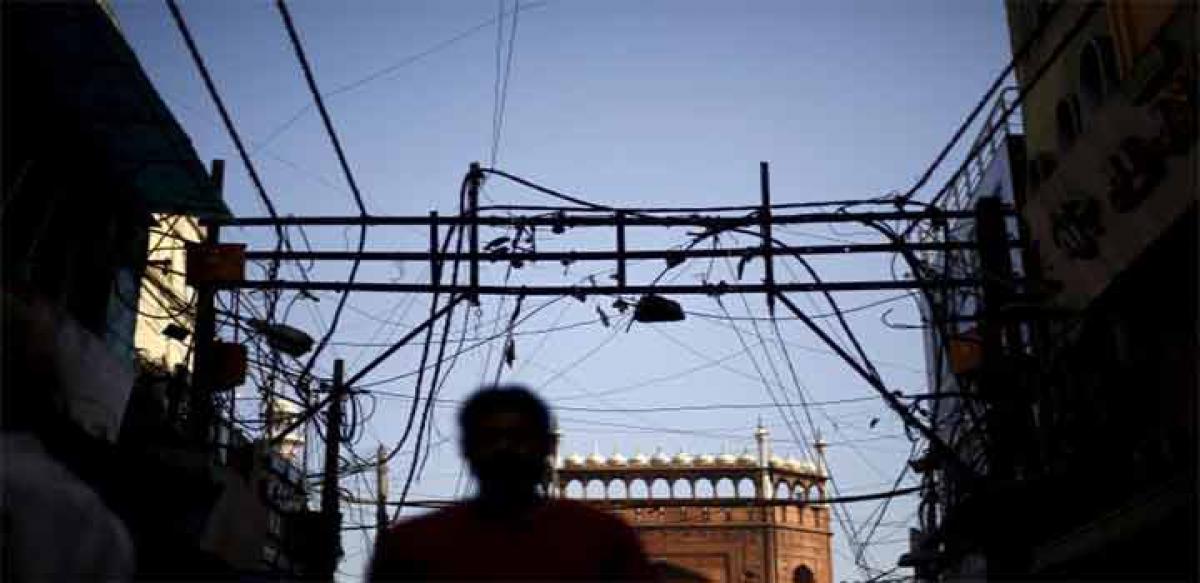Live
- RBI sees India's GDP growth trend surging past 7 per cent
- Nifty Smallcap index registers fresh all-time high
- SC suspends Orissa Cong MLA's sentence in graft case
- RBI lists 6 factors powering India’s take-off to become world’s 3rd largest economy
- Multiple catalysts for re-rating across verticals as RIL exits fourth investment cycle: Morgan Stanley
- ISL announces tentative venue for 2023-24 final
- Indira Gandhi coined 'Gareebi Hatao' slogan, her grandson still repeating it: CM Yogi
- Pawan Kalyan’s assets up by 215 per cent, owns 11 vehicles
- Byju’s vs investors: NCLT defers hearing to June 6
- Biryani blunder: Lord Ram's image on plates sparks outrage in Delhi
Just In

The Central government would like states to raise power prices gradually, but they must decide by themselves, Union Power Minister Piyush Goyal told reporters here on Wednesday.
- Centre wants states to raise power tariff gradually
- Cabinet to deliberate on PM’s grand plan later this month
.jpg)
New Delhi: The Central government would like states to raise power prices gradually, but they must decide by themselves, Union Power Minister Piyush Goyal told reporters here on Wednesday.
Goyal said this is being done as part of a rescue plan Prime Minister Narendra Modi has urged to fix the finances of the country's money-losing power utilities.
The rescue plan would go to the Cabinet for clearance this month, a power ministry source said.The Prime Minister will tell states to raise electricity prices in return for access to a financial bailout package, a politically contentious move that risks a backlash from farmers and consumers long used to free or cheap power.
Modi, who has made overhauling of the loss-making power utilities a priority, convinced that if he can fix their finances he will recover his reputation as an economic reformer willing to take tough decisions.
State-run electricity distributors, which collectively owe $66 billion, are running out of cash and struggling to repay loans, squeezing banks' ability to spur credit growth and undermining Modi's campaign to lure energy-hungry manufacturers to expand production.
Goyal said he would continue to hold meetings with states over the next few days to agree a plan. "We are trying to introduce innovative ways to encourage gradual rises (in tariffs)," he told reporters, saying that tariff setting was the prerogative of local regulators but that the government wanted to help power utilities fix the financial mess.
Modi is to take the politically contentious move of telling states to raise electricity prices, which are often held artificially low to appeal to key groups of voters such as farmers and the poor, and agree to performance improvements, a senior government source said.
In return for raising prices, the eight worst affected states will be allowed to absorb up to 75 percent of the debt on the distributors' books depending on their fiscal position, the source said, requesting anonymity because the plan is not yet public.
Modi, who successfully overhauled the power industry in his home state of Gujarat in the mid-2000s, has told the Union power ministry and states they must act urgently to fix the power sector,
a second government source said, asking not to be named. After Cabinet approval, states will need to strike agreements with distributors and the power ministry, the government source said.
The source added that it will not be easy and that each deal will need to be tailored individually, with varying tariff rises and performance targets.
SENSITIVE SUBJECT
In India, the price of power is a sensitive subject and generally decided by individual state regulators. New Delhi's past attempts at instigating reform, including a 2012 rescue plan under Modi's predecessor, have largely failed. Many people view free or cheap power as a right.
Politicians appeal to key groups of voters like farmers or the poor by keeping prices low and ignoring theft, prompting scepticism about whether states will agree to any package that forces tariff hikes.
"There are two things that states completely avoid: raising tariffs for farmers and privatisation. These are hugely political," said Debasish Mishra, a power expert at Deloitte. "The political parties know what sells and what will keep them in power."
Recent attempts at raising tariffs have proven politically difficult. However, the pro-people power policy of Kejriwal’s Aam Aadmi Party came to power in Delhi ‘evaporating all doubts of his opponents on the power front. During his first shot as Chief Minister, Arvind Kejriwal had promised 50% cut in power tariff.
He did so primarily on his conviction that the power distribution companies had indulged in financial irregularities leading to inflated cost of procurement and distribution. In fact, Kejriwal’s Cabinet outlined three focus areas including providing cheaper power and water, women’s security and improving maternal and child health
In undivided Andhra Pradesh, incumbent Chief Minister N Chandrababu Naidu had lost the elections in 2004 primarily for his anti-people power policy.
Naidu was perceived to have ignored the large rural population with his policies, which created a negative image for him. In the last week of May 2000, even as the peasants in 18 out of the 23 districts in the state were suffering under the worst drought and were committing suicides,
Naidu, allegedly at the behest of the World Bank had resorted to the steepest ever hike in electricity charges. Subsequently, he lost the power.

© 2024 Hyderabad Media House Limited/The Hans India. All rights reserved. Powered by hocalwire.com







